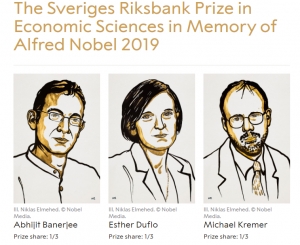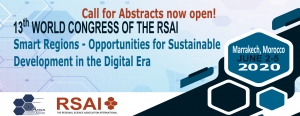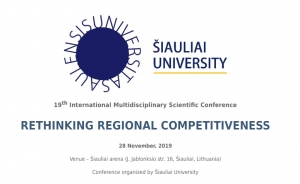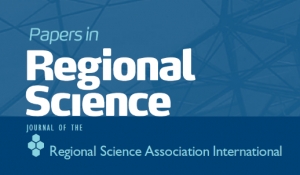Council
Elisabete Martins
Two Economic Geography Lectureships in CURDS Newcastle
There are 2 x Economic Geography Lectureships based in CURDS and Geography in Newcastle University.
The post seeks to advance critical perspectives on urban and regional development. Themes of interest may include, but are not limited to: cities and city-regions; spatial inequalities and justice; demographic change and migration; finance and debt; energy and infrastructure; institutions, governance and policy.
More details are available at: https://www.ncl.ac.uk/gps/geography/about/joinus/
The Sveriges Riksbank Prize in Economic Sciences in Memory of Alfred Nobel 2019
The Prize in Economic Sciences 2019
The Royal Swedish Academy of Sciences has decided to award the Sveriges Riksbank Prize in Economic Sciences in Memory of Alfred Nobel 2019 to
|
Abhijit Banerjee Massachusetts Institute of Technology, Cambridge, USA |
Esther Duflo Massachusetts Institute of Technology, Cambridge, USA |
Michael Kremer Harvard University, Cambridge, USA |
“for their experimental approach to alleviating global poverty”
Their research is helping us fight poverty
The research conducted by this year’s Laureates has considerably improved our ability to fight global poverty. In just two decades, their new experiment-based approach has transformed development economics, which is now a flourishing field of research.
Despite recent dramatic improvements, one of humanity’s most urgent issues is the reduction of global poverty, in all its forms. More than 700 million people still subsist on extremely low incomes. Every year, around five million children under the age of five still die of diseases that could often have been prevented or cured with inexpen- sive treatments. Half of the world’s children still leave school without basic literacy and numeracy skills.
This year’s Laureates have introduced a new approach to obtaining reliable answers about the best ways to fight global poverty. In brief, it involves dividing this issue into smaller, more manageable, questions – for example, the most effective interventions for improving educational outcomes or child health. They have shown that these smaller, more precise, questions are often best answered via carefully designed experiments among the people who are most affected.
In the mid-1990s, Michael Kremer and his colleagues demonstrated how powerful this approach can be, using field experiments to test a range of interventions that could improve school results in western Kenya.
Abhijit Banerjee and Esther Duflo, often with Michael Kremer, soon performed similar studies of other issues and in other countries. Their experimental research methods now entirely dominate development economics.
The Laureates’ research findings – and those of the researchers following in their footsteps – have dramati- cally improved our ability to fight poverty in practice. As a direct result of one of their studies, more than five million Indian children have benefitted from effective programmes of remedial tutoring in schools. Another example is the heavy subsidies for preventive healthcare that have been introduced in many countries.
These are just two examples of how this new research has already helped to alleviate global poverty. It also has great potential to further improve the lives of the worst-off people around the world.
__________________
Abhijit Banerjee, born 1961 in Mumbai, India. Ph.D. 1988 from Harvard University, Cambridge, USA. Ford Foundation International Professor of Economics at Massachusetts Institute of Technology, Cambridge, USA.
Esther Duflo, born 1972 in Paris, France. Ph.D. 1999 from Massachusetts Institute of Technology, Cambridge, USA. Abdul Latif Jameel Professor of Poverty Alleviation and Development Economics at Massachusetts Institute of Technology, Cambridge, USA.
Michael Kremer, born 1964. Ph.D. 1992 from Harvard University, Cambridge, USA. Gates Professor of Developing Societies at Harvard University, Cambridge, USA.
https://www.nobelprize.org/prizes/economic-sciences/2019/summary/
Call for Abstracts for RSAI Congress 2020 is now open!
We are delighted to announce that the Call for Abstracts for RSAI Congress 2020 is now open!
The Regional Science Association International (RSAI) and the Moroccan Regional Science Association (AMSR) invite regional scientists, economists, economic geographers, urban planners, policy makers, and researchers of related disciplines to participate in the 13th World Congress of the Regional Science Association International, with the main theme "Smart Regions – Opportunities for sustainable development in the digital era". The Congress will be hosted by the Moroccan Regional Science Association.
We invite formal paper presentations (deadline of November 15, 2019. The abstract submission portal is now open. Full information on the venue, abstract submission, registration, schedule of events, accommodation and travel information is posted at https://www.regionalscience.org/2020worldcongress
About the Focal Theme
The congress is open for the world-wide diverse audience of regional scientists including academics, policy makers and practitioners and aims to bring together the key elements of multidisciplinary regional science research and to provide a scientific platform for presenting and discussing research at the frontiers of the spatial sciences in a broad sense. The themes which will be addressed zoom in particular on the pressing challenges of meeting the 2030 Agenda of Sustainable Development Goals, in both developed and developing economies. As a new challenge to regional science research is formed by the emerging digital technology and its implications for analysis, monitoring, evaluation and forecasting spatial dynamics at all levels, the theme chosen for the congress is ‘Smart Regions- Opportunities for Sustainable Development in the Digital Era’. Therefore, the potential of spatial and temporal big data, machine learning, artificial intelligence, social media information, and of the new spatial maps emerging from digitization and robotization will be addressed by the congress as well, as these forces will have far-reaching impacts on human behaviour and interaction in space. Topics such as urban-rural development, migration, spatial and resources (al)location, border effects, urbanization, sustainable cities, mobility, land use, environmental quality, disaster management, energy transition, culture, poverty, segregation, spatial modelling are important issues covered in the 2020 RSAI World Congress.
We look forward to welcoming you in the dazzling city of Marrakech in June 2020.
With warmest regards,
The Organizing Committee
|
Abstract/Paper Submission: Visit the RSAI Congress website, www.regionalscience.org/2020worldcongress, and follow the abstract submission instructions; Please note, there is a limit of two paper presentation per paid, registered participant. |
Invitation Conference Region Siauliai, Lithuania, 28 November 2019
Dear colleagues,
We are delighted to invite you to participate in the 19th International Scientific Conference „RETHINKING REGIONAL COMPETITIVENESS”, which will be held on 28th November 2019 in Siauliai, Lithuania.
The special topic of the plenary session – “Circular economics for the region competitiveness”.
Registration deadline – November 8, 2019.
Registration form: https://docs.google.com/forms/d/e/1FAIpQLSdoMH_zMkKo7ZcQuv-5Nzd5gqPmeTRdQKu3xu1nEjSg16mfBw/viewform
Conference fee - 30 EUR.
We kindly ask you to forward this information to the colleagues who might be interested in the conference.
Please find more information in the attached invitation and www.su.lt/rethinking-regional
Best regards,
Conference Organizers
Tenured Professor in Geographic Information Science and Dangermond Endowed Chair Position – UC Santa Barbara
https://recruit.ap.ucsb.edu/JPF01573
Tenured Faculty Position Geographic Information Science (GIScience) – Department of Geography
The University of California, Santa Barbara, Department of Geography invites applications for the Jack and Laura Dangermond Endowed Chair in Geography. This will be a Tenured faculty position at the level of Associate or Full Professor in Geographic Information Science, with an anticipated start date of July 1, 2020. The Department is looking for an individual with active research and teaching interests in Geographic Information Science (GIScience). The successful candidate will be broadly trained with interdisciplinary experience and a commitment to disciplines directly relevant to GIScience. We are particularly interested in applicants who have made and will continue to make significant contributions to either the modeling, representation, retrieval, integration, visualization, and/or analysis of spatial data.
Responsibilities of faculty members generally include teaching at undergraduate and/or graduate levels, recruitment, supervision, and mentorship of graduate students, participation in university service and professional activities, and the development of an actively funded research program of the highest quality. Only applicants with a PhD in an appropriate field at the time of application will be considered. Applicants with a record of research and professional activity commensurate with a tenured appointment will be given preference. A demonstrated record of excellence in research, and a record of (or potential for) outstanding teaching are desired. Successful candidates will have a record of collaborative research, and will be able to leverage synergies within the Department of Geography. The University is especially interested in candidates who can contribute to the diversity and excellence of the academic community through research, teaching and service as appropriate to the position.
Applications should be submitted electronically, and must include:
- Cover Letter
- Curriculum Vitae
- Statement of Research
- Statement of Teaching
- Statement of Contribution to Diversity (Optional)
- Applicants will need to provide contact information for 3 references
Diversity, equity, and inclusion are core values at UC Santa Barbara. Our excellence can only be fully realized by faculty, students, and staff who share our commitment to these values. The department encourages all applicants to submit a Statement of Contributions to Diversity addressing past and/or potential contributions to diversity through research, teaching, and service.
Applications received by December 16, 2019 will be given priority consideration, but the position will remain open until filled. To apply please visit: https://recruit.ap.ucsb.edu/apply/JPF01573
The University of California is an Equal Opportunity/Affirmative Action Employer. All qualified applicants will receive consideration for employment without regard to race, color, religion, sex, sexual orientation, gender identity, national origin, disability status, protected veteran status, or any other characteristic protected by law.
The latest issue of Papers in Regional Science is available! Volume 98, 5 (October 2019)
|
Papers in Regional Science Pages: 1859-2208 October 2019 |
ISSUE INFORMATION
Pages: 1859-1860 | First Published: 13 October 2019
FULL ARTICLES
Asymmetric effects of monetary policy shocks across US states
Davide Furceri, Fabio Mazzola, Pietro Pizzuto
Pages: 1861-1891 | First Published: 08 June 2019
A ticket to ride: Education and migration from lagging areas
Guglielmo Barone, Antonello d’Alessandro, Guido de Blasio
Pages: 1893-1902 | First Published: 12 March 2019
Zhan Cao, Ben Derudder, Zhenwei Peng
Pages: 1903-1924 | First Published: 28 February 2019
Measuring quality of government in EU regions across space and time
Nicholas Charron, Victor Lapuente, Paola Annoni
Pages: 1925-1953 | First Published: 28 February 2019
Aggregate effects and measuring regional dynamics
Ryan Greenaway‐McGrevy, Kyle Hood
Pages: 1955-1991 | First Published: 23 March 2019
Inside the regional innovation system black box: Evidence from French data
Hervé Ott, Patrick Rondé
Pages: 1993-2026 | First Published: 02 May 2019
A multiplier evaluation of primary factors supply–shocks in a regional economy
- Alejandro Cardenete, M. Carmen Lima, Ferran Sancho
Pages: 2027-2045 | First Published: 01 April 2019
Christina Greßer, David Stadelmann
Pages: 2047-2073 | First Published: 28 March 2019
Carla Alexandra Filipe Amado, Ana Paula Barreira, Sérgio Pereira Santos, Maria Helena Guimarães
Pages: 2075-2097 | First Published: 22 May 2019
Francesco Pagliacci
Pages: 2099-2114 | First Published: 14 May 2019
Keeping up appearances: Spatial spillovers and housing renovations
Nicholas B. Irwin
Pages: 2115-2133 | First Published: 18 May 2019
Broadband's relationship to rural housing values
Steven Deller, Brian Whitacre
Pages: 2135-2156 | First Published: 23 May 2019
Xiang Luo, Zuo Zhang, Xinhai Lu, Lu Zhang
Pages: 2157-2178 | First Published: 01 April 2019
Is planning delay really a constraint in the provision of housing? Some evidence from Israel
Ziv Rubin, Daniel Felsenstein
Pages: 2179-2200 | First Published: 19 March 2019
RESEARCH NOTES & COMMENTS
Preference matching, income, and population distribution in urban and adjacent rural regions
Amitrajeet A. Batabyal, Hamid Beladi
Pages: 2201-2208 | First Published: 27 February 2019
New issue (number 43) of Investigaciones Regionales - Journal of Regional Research
Dear colleague:
We have just published a new issue of the journal Investigaciones Regionales - Journal of Regional Research (Issue Nº 43). It is now available only in on line version.
About Investigaciones Regionales – Journal of Regional Research:
The founding aim of Investigaciones Regionales–Journal of Regional Research was to create a prestigious journal through which to disseminate quality research carried out in the broad academic and professional field of regional, urban and territorial studies. The review process of the papers submitted to the Journal follows international standards.
Investigaciones Regionales-Journal of Regional Research is ranked as Q2 by Scimago JRC (Scopus), in Economics, Econometrics and Finance, and indexed in other scientific and academic international databases (Emerging Source Citation Index OF Clarivate Analytics, EBSCO, ProQuest, EconLit, RePec, DOAJ, Redalyc, Latindex, Fuente Académica,…).
The Journal has a multidisciplinary approach, welcoming submissions from fields such as Economics, Geography, Sociology, Land Planning and Political Science, whose scientific focus, originality and added value contribute to the dissemination of new ideas and methodological approaches, strengthening and improving the quality of the publication, via its This email address is being protected from spambots. You need JavaScript enabled to view it..
The contents of this issue are:
Editorial
Vicente Royuela
European Regional Policy
Francesco Molica, Matteo Salvai
Articles
Eva Coll- Martínez
- Teresa Fernández Fernández,]uan Luis Santos, Francisco José Blanco Jiménez
Magdalena Ferrán Aranaz, Lorenzo Escot
La generación real y potencial de empleo de la ley de dependencia: un análisis regional
Diana Fernández Méndez, Melchor Fernández Fernández, Alberto Meixide Vecino
Los territorios de la exclusión social en Argentina. Evidencia empírica sobre las décadas 1990-2010
María Celeste Gómez, Liliana E. Pereyra
Luis Quintana, Carlos Salas, Ronny Correa-Quezada
Transporte aéreo y turismo: un análisis para el mediterráneo español
Luisa Alamá-Sabater, Andres Artal-Tur, Diego López Olivares
Design of an indicator of confidence in the public authorities based on fuzzy logic
Juan Carlos Martín, Concepción Román, Christian Stalin Viñán
To contact Us and Submit Manuscripts:
Investigaciones Regionales – Journal of Regional Research
Email: This email address is being protected from spambots. You need JavaScript enabled to view it.
The article will be sent through the portal Open Journal System (OJS) of the Spanish Repository of Science and Technology (RECYT): https://recyt.fecyt.es/index.php/IR/login
Yours sincerely,
Conxita Rodríguez i Izquierdo
Secretaria AECR y de la Revista IIRR-JoRR
ATENCIÓN DIRECCIÓN DE ENVÍO: 1
C/Finlàndia, 27 B.I. – 08014 Barcelona
Dirección Fiscal:
C/ Viladomat, 321 entresuelo - 08029 Barcelona
Teléfono: + 34 933101112
E-mail: This email address is being protected from spambots. You need JavaScript enabled to view it.
Web: www.aecr.org - Facebook - Twitter - Linkedin
Revista Investigaciones Regionales – Journal of Regional Research
ISSN: 1695-7253
E-ISSN: 2340-2717
Assistant Professor, Data Science and Spatial Analysis, School of Geography & Development, University of Arizona
Position Summary
The School of Geography and Development at the University of Arizona (geography.arizona.edu) seeks a tenure-eligible Assistant Professor in data science, spatial analysis, statistics and quantitative methods. The ideal candidate will advance the School’s research on pressing social, political, economic, and environmental issues. Successful applicants will have an active research program in data science and spatial analysis of complex data sets. We particularly seek individuals whose scholarship can contribute to the School’s program in Urban and Regional Development, which includes the study of cities and their environs. The candidate selected will enhance the School’s research and teaching capacities across a diverse range of topics and contribute to the Graduate Interdisciplinary Program in Statistics and Data Science. The position will provide opportunities to connect with research communities and resources across campus, including the Cyberinfrastructure for Data Management and Analysis Center (http://www.cyverse.org).
Duties & Responsibilities
The Assistant Professor will teach a mix of undergraduate and graduate courses in quantitative methods and in topical areas to support our programs in Urban and Regional Development and Geographic Information Systems and Technology. Instructional duties may involve a mix of in-person and online offerings. The appointee will also participate in the activities of the Graduate Interdisciplinary Program in Statistics. The distribution of effort will normally be 40% Research, 40% Teaching, and 20% Service.
Minimum Qualifications
We seek a scholar with a strong research record and a promising agenda for future work. A Ph.D. in Geography or a related field is required by the time of appointment. Applicants in related fields should demonstrate that their research is sufficiently geographical to fit within a multi-faceted Geography department.
Preferred Qualifications
Experience teaching at the collegiate level
For more information contact the search committee chair: Tom Evans This email address is being protected from spambots. You need JavaScript enabled to view it.
To apply please see: https://uacareers.com/postings/42118
School of Community and Regional Planning, University of British Columbia: Two faculty positions
The School of Community and Regional Planning is currently in the process of advertising two faculty positions as follows:
• Associate or Full Professor (tenure) – visit www.facultycareers.ubc.ca/34334
• Assistant Professor (tenure-track) – visit www.facultycareers.ubc.ca/34335
We seek candidates whose research and teaching interests complement or deepen our School’s strengths, but most importantly we are keen to appoint individuals who are committed to doing research that seeks to make an impact and enhance the well-being of communities and the natural environment. We’d also be pleased to receive applications from candidates in new fields of expertise for the School and/or emerging areas of scholarship. Evidence of innovation and/or new ideas in relation to the theory and practice of knowledge mobilisation would be particularly welcomed.
Informal inquiries about the positions are welcomed and should be addressed to the Chair of the Search Committee, Professor Heather Campbell via email at This email address is being protected from spambots. You need JavaScript enabled to view it.
The deadline for applications is 31 October 2019.
Post-Doctoral Researchers in regional economics and/or entrepreneurship
Jönköping International Business School
Jönköping International Business School (JIBS) is one of four schools at Jönköping University. We offer an international and team-oriented workplace with competitive education programmes, across Bachelor, Master and Doctoral levels, as well as a thriving research environment and many opportunities for personal development. Our mission is to advance the theory and practice of business, with specific focus on entrepreneurship, ownership and renewal. Our guiding principles are; international at heart, entrepreneurial in mind and responsible in action. JIBS is double-accredited, by EQUIS and AACSB. Recent assessments of research productivity and impact ranks JIBS first in Sweden in economics and business administration and first in Europe and second in the world in entrepreneurship.
To further strengthen our position in entrepreneurship and regional science research, we are looking for a Post-Doctoral Researcher to our Centre for Entrepreneurship and Spatial Economics (CEnSE). The position is for two years full time with a possible extension.
CEnSE is a multi-disciplinary research center that performs applied research relating to issues of entrepreneurship and business renewal, regional development and growth, and the interrelation between urban and rural areas. A substantial part of CEnSE research addresses policy relevant problems, for example how accessibility affects regional growth and the way entrepreneurial and innovative processes in business and society are dependent on knowledge and creativity. For more information please visit http://center.hj.se/cense.
WORKING TASKS / QUALIFICATIONS
The position requires a PhD degree in a relevant discipline, for example, economics, economic geography or business administration.
As a Post-Doctoral Researcher, we offer you full-time employment. Most of your time will be devoted to conduct research and take an active role in the continued development of CEnSE (80%). The remaining time is allocated for teaching (20%).
We seek candidates who have a strong wish to conduct high-quality academic scholarship on regional science and/or entrepreneurship. Since the main language of research and teaching at JIBS is English, you must be fluent in both written and spoken English to be an eligible candidate. Skills in other languages, including Swedish, are an advantage but not a requirement.
In making the selection, importance will be given to the applicants’ qualifications in the following areas:
- Capacity and interest to engage in academic research at the highest level.
- A record of publications, especially in journals ranked in the ABS list, or a promising pipeline of papers targeted for publication in such journals.
- Personal networks and collaborations with researchers in an international context.
- Openness to engage in joint projects and activities with colleagues at JIBS/CEnSE.
- Interest and ability to teach university courses at different levels and to communicate with academic and professional audiences.
For full eligibility requirements for Post Docs see Appointment Procedure at Jönköping University.
INFORMATION
Employment starts as soon as possible, to be agreed upon. The positions are full time (100%) and temporary for two years.
Your PhD degree should not be older than 5 years at the date you application is sent in.
For more information about the position, please contact Professor Johan Klaesson This email address is being protected from spambots. You need JavaScript enabled to view it. (Director of CEnSE) or Associate Professor Mikaela Backman, This email address is being protected from spambots. You need JavaScript enabled to view it..
APPLICATION
Your application must include:
- a letter-of-intent explaining why you are applying to the position and why you think you will be a good fit for JIBS and CEnSE;
- a description of yourself including your background and main interests;
- a research agenda (max. 1000 words), expressing your present and future research interest in the field;
- CV and attested documents (transcript, diploma), including a full list of publications and teaching experience;
- up to 5 of your most important scientific contributions as well as your doctoral dissertation;
- the name, phone numbers, and e-mail addresses of at least 2 references.
Send in your application electronically before November 9, 2019.
Incomplete applications will not be processed.
| Type of employment | Temporary position longer than 6 months |
|---|---|
| Contract type | Full time |
| First day of employment | Starts as soon as possible, to be agreed upon |
| Salary | Monthly |
| Number of positions | 1 |
| Working hours | 100% |
| City | Jönköping |
| County | Jönköpings län |
| Country | Sweden |
| Reference number | 2019/3930-221 |
| Published | 09.Oct.2019 |
| Last application date | 09.Nov.2019 11:59 PM CET |
Applications should be sent electronically via this link: https://ju.varbi.com/en/what:job/jobID:293642/where:4/
About Us
The Regional Science Association International (RSAI), founded in 1954, is an international community of scholars interested in the regional impacts of national or global processes of economic and social change.







